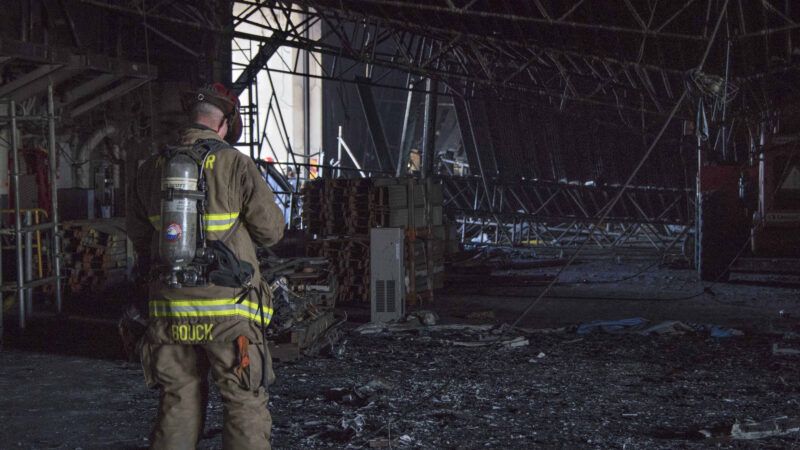Californians Are Discovering Why Government Is a Terrible Landlord
When everyone owns something, no one does.

I once had the misfortune of living next to vacant land managed by a county fire department, which became a potential problem during a particularly bad wildfire year. The dry weeds were nearly the height of cornstalks. I had enough after my neighbors and I—most of whom had green, well-maintained lawns—received notices from the county telling us to keep our yards trimmed.
I started making calls to the appropriate agencies and got the usual bureaucratic runaround. I still remember my call to the weed abatement department, which assured me it would handle the situation. "Aren't you going to take the address?" I retorted as the person was about to hang up. The county finally mowed the property after the right staffer in an elected official's office intervened.
Local officials and prosecutors often make a big deal about clamping down on some allegedly villainous slumlord—and it's no surprise some property owners behave irresponsibly—but often the biggest slumlords are government agencies. I was reminded of this after two high-profile news stories captured Southern Californians' attention.
The first was the tragic fire at the historic north hangar at the former Marine Corps base at Tustin, which turned one of the world's largest and most spectacular wooden structures—built to house blimps that patrolled the Pacific after Pearl Harbor—into a smoldering heap. The second was the fire that damaged Interstate 10 in Los Angeles, thus shuttering two miles of freeway and creating a commuter nightmare.
Fires happen, but both are the result of government neglect. The hangar is owned by the United States Navy, which has let the property languish since the base was decommissioned in 1999. Severe wind storms battered it in 2013, but that didn't spur the military into action. The inadequately fenced area was easily accessible. The Register reports many other buildings on the site are in disrepair.
Although the Navy also owns the south hangar, the city leases it and has taken far better care of it. Tustin even uses it as a filming location and for community events. Nevertheless, city, county and federal officials have dragged their feet on redevelopment plans for years. The military—which, by the way, remains perhaps the nation's largest polluter—has yet to complete its remediation. It's only been decades.
Regarding the freeway mess, it took place in an area where 16 homeless people were living. The AP reported that a federal judge three years ago blasted the city and county of Los Angeles over its inability to deal with the 7,000 people living under freeways. A company that leased the land where the fire apparently started said it had "complained to city officials numerous times about fires started by homeless people on or near the property" and "had been denied access to the site since October." Now think back to my story about cutting weeds.
State officials have repaired the freeway damage quickly given bad publicity, but the dangerous fire would never have happened if the government maintained its property. Just look at the constant state of freeway and road disrepair—not to mention the near collapse of spillways at the Oroville Dam in 2017—to recognize that public agencies are terrible stewards of property. It's enough to make one dust off a copy of Ayn Rand's Atlas Shrugged to remember that lesson.
For another reminder, here's an excerpt from a 2011 editorial I wrote about Caltrans, which "used the power of eminent domain to acquire thousands of homes and other properties for roads and freeways that it never built, as a 2006 Orange County Register investigation revealed. Instead of selling off the properties, the agency mostly disregarded them, thus becoming what the Register referred to as the biggest slumlord in the state."
As another example, the city of Santa Ana had long been awash in vacant lots. It's not the only California city where now-defunct government redevelopment agencies condemned and collected tracts for potential new developments, but instead largely let them turn into fenced-off, weed-choked blights. Now please tell me again why you want government to have more power over private property.
And just look at how cities manage their own "public" property. San Francisco might not be the hellscape that some critics say it is, but the homelessness crisis has spiraled out of control. Many streets and parks resemble tent cities. City officials cleaned up part of the downtown area in record time in anticipation of a meeting between President Joe Biden and Chinese President Xi Jinping, but expect things to deteriorate again quickly.
The lesson is clear: When everyone owns something, no one does. That leaves its management to red-tape-laden and indifferent government agencies, which lack the incentives of private owners (who want to protect their investment and avoid liability). If we want to fix infrastructure or even keep the weeds down, we need less government involvement, not more.
This column was first published in The Orange County Register.


Show Comments (13)